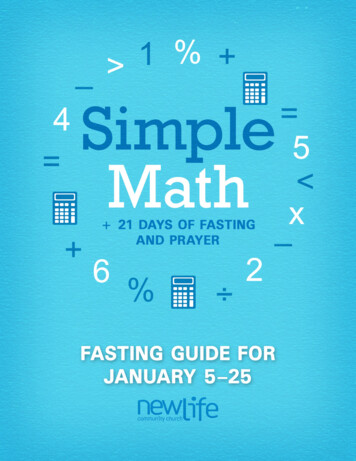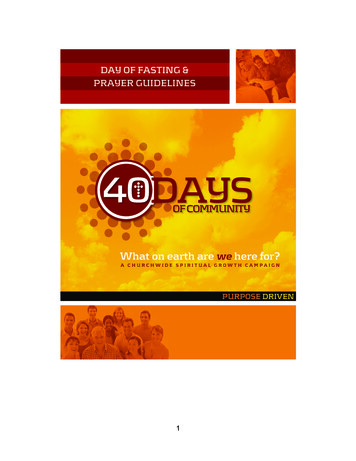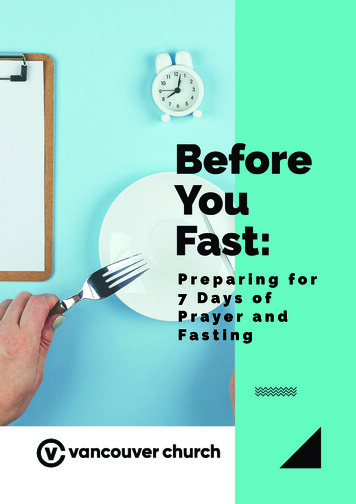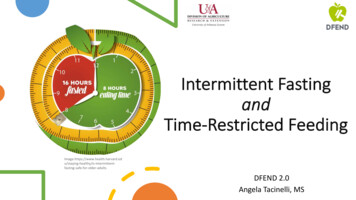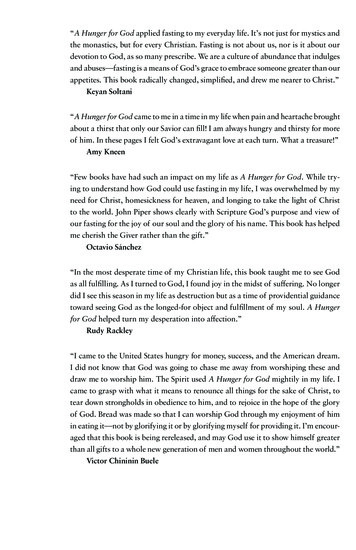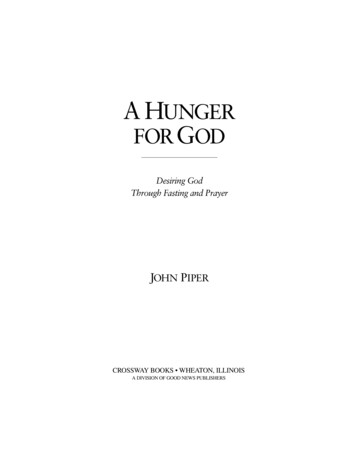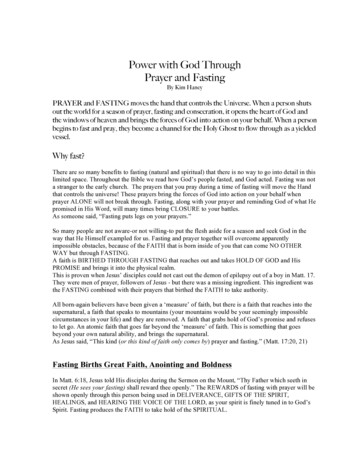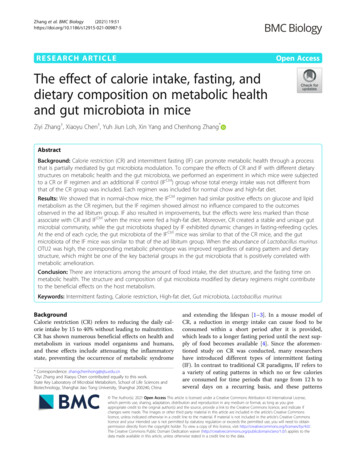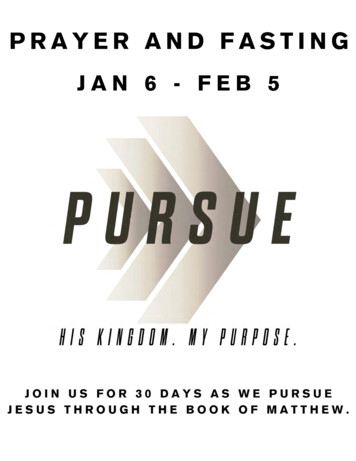
Transcription
In 2020, Living Word Church’s vision is to Pursue. Pursue what? We want topursue His Kingdom and our purpose. We are commanded to pray that His kingdomwill come and that His will be done on earth as it is in heaven (Matth.6:10). In otherwords, we are to pray for the kingdom to come in its fullness and we are to do our best,through His grace and the power of the Holy Ghost, to implement it in our areas ofresponsibility and influence.Matthew 28:19-20 states that we are to “make disciples of all nations, baptizingthem in the name of the Father, and of the Son, and of the Holy Spirit, teaching them toobserve all that I have commanded you. And behold, I am with you always, to the end ofthe age.” That’s our purpose! We all may take a different way of accomplishing it, but thepurpose is the same for everyone.I would like to encourage every member of this church to participate in thisseason of prayer and fasting. Pursuing His Kingdom and discovering Our Purpose seemslike a tall order. To some it may seem impossible. I remind you that Jesus said, “Butthis kind does not go out without prayer and fasting.” Jesus was casting out a demonwhen He said this. He was also stating that those things that you find impossible can beaccomplished through prayer and fasting.Before you start, please read the information about fasting if you are new to thisdiscipline. I would also encourage to set some goals before you start on this journey.Thank you for participating, I look forward to Pursuing His Kingdom with you.Pastor David E. MeyerSenior Pastor
EIGHT STEPS TO EFFECTIVE FASTING1. Fast SENSIBLY. Don’t feel that you must fast many days to be effective.Many biblical fasts were “until evening’ (Judges 20:16; II Samuel 3:35; Acts10:30).2. Fast SENSITIVELY. When Israel fasted before a crucial battle, the Biblesays they “inquired of the Lord.” (Judges 20:23; I Samuel 23) When we fastwe should take special time to hear God speak. (Acts 13:1-2)3. Fast SYSTEMATICALLY. When Jesus taught His disciples about fasting,He began with the words “when you fast” (Matthew 6:16). He wassuggesting that believers should have regular times of fasting, whetherone day a week or a portion of a day each week.4. Fast SACRIFICIALLY. If we normally do not eat breakfast it is not reallya sacrifice to fast breakfast. A true fast must be a sacrifice. David said, “Myknees give way from fasting; my body is thin and gaunt” (Psalm 109:24).True fasting must have an humbling effect on us (Ps 35:13).5. Fast SPECIFICALLY. God said to Israel, “Is not this the fast that I havechosen? (Isaiah 58:6). We must ask God to direct us in the focus of ourfasting.6. Fast SUPERNATURALLY. The very nature of fasting requiresdependence on God’s supernatural power to see us through. When the earlychurch fasted before sending out workers, the Bible says, “The Holy Spiritcame” (Acts 13:2,3). We need God’s Spirit as we fast.Fasting Guide
7. Fast SOBERLY. Jesus cautioned His disciples not to make a spectacle outof fasting like the religious leaders did. This type of fasting only gets theattention of men and not of God. (Matthew 6:16-17)8. Fast SECRETLY. Jesus cautioned His disciples never to boast about ourtimes of fasting but rather to keep our times of fasting as a personalcommitment (Matthew 6:18).TYPES OF FASTING1. The Normal Fast: In this type of fast the person abstained from foodbut not water. The duration can be that which the individual or group feelsled to set. Jesus fasted for 40 days (Matthew 4:2). However, the morecommon practice of a normal fast appears to be from one to three days.2.The Partial Fast: In this type of fast, the emphasis is placed onrestriction of diet, rather than abstaining completely from eating. Examplesare: Daniel, Shadrack, Meshach and Abednego eating only vegetables anddrinking only water (Daniel 1:15) and later on when Daniel alone practiceda partial fast for three weeks (Daniel 10:3).The partial fast allows a greatmany variations: Method of living exclusively on one type of food for the duration ofthe fast eg. fruits and vegetables, plain bread and water, plain rice, orjuices. We are recommending a fresh fruit and vegetable juice fast forthose who want to take the challenge.Fasting Guide
Omitting a certain meal each day and spending that meal time withthe Lord. (Vigilance is needed to ensure that the value of omittingone meal is not offset by increasing intake at the others).3.The Absolute Fast: An absolute fast is one in which the personrefrains from both food and water. This type of fast is not to exceed threedays. Exceptions to this three-day limit (1 Kings 19:8; Deuteronomy 9:9-18and Exodus 34:28) were based upon direct, divine guidance and care.Examples of the absolute fast are: Moses (Deuteronomy 9:9-18 and Exodus34:28); Elijah (1 Kings 19:8); Ezra (Ezra 10:6); Esther and her household(Esther 4:16); and Paul (Acts 9:9).Fasting cleanses the body and refreshes the soul. During a fast the bodycleanses, purifies; and essentially resurrects itself. Nature tells us to fast.When we have no appetite during an illness, fasting is nature’s way toaccelerate recovery. Fasting is NOT starvation. It is reasonable for a healthyindividual to fast for 2 or 3 days without supervision.PRE-FAST CAUTIONS1. DO NOT BEGIN YOUR FAST SUDDENLY The body grows accustomedto fasting by degrees.2. Reduce food intake gradually from three times a day to two times, thenonce a day, and into the fast.3. Clean the digestive tract prior to fasting. Some recommend the last mealbefore a fast to be fruits. A person that has problems with constipation heshould take an enema.Fasting Guide
4. Cease taking coffee or tea a few days before a longer fast, and so get overthe caffeine-withdrawal headache before you start.DURING THE FAST1. Drink water (preferably distilled or boiled warm water with a pinch ofsalt). Be careful not to drink too much water at one time. A glass or soseveral times a day is ideal. One should not drink milk or coffee or otherbeverages when fasting for to do so is dieting and not fasting. Water is apurifying agent, and is necessary to wash out the poisons from the system.2. Drink fruit and vegetable juices. They are full of nutrients, provideinstant nutrition and are rapidly absorbed by the body. Fruit juices are energizers and body cleansers. Dilute with waterbecause fruit juices are high in natural sugar and when drank neatduring a prolonged fast could make you feel a little dizzy. Mixing and matching too many fruit juices during a prolonged fastwill only put unnecessary strain on the digestive system. Thecommon recommendation is to mix apple with any of these fruits:grapefruit, mango, peaches, guava, kiwi, papaya, pear. All melons(honeydew, rock melon, watermelon) should be taken alone. Vegetable juices are building blocks supplying the body with thenecessary vitamins and minerals to build strong bones and tissues.Fasting Guide
Mix with cucumber, carrots or apples or dilute with water and take insmall quantities (1 cup) to avoid any discomfort. All juices should be sipped slowly. Anyone who must limit sugar intake in their diet should consumefruit juices sparingly. The common recommendation is not morethan 500 ml spread throughout a week & be sure to follow yourdoctor’s instructions.3. Refrain from taking an excessively hot bath. Having a very hot bathduring a prolonged fast can cause dizziness, and you may be unable tocontinue. Instead bathe in tepid, lukewarm water. It is important to batheregularly during a fast as many impurities are secreted through the poresof the skin and cause a foul odor. Also, be sure to brush your teeth often asfasting produces bad breath.4. Do not engage in excessive work, exercise. Some light exercise (e.g.walking) is beneficial. Reading the bible during a fast is a necessity andspiritually beneficial.5. Walk, read, pray or worship Christ at mealtimes to help overcome thegreat temptation to satisfy the eating instinct. If possible, avoid looking atfood and coming to the table at meal times. If you remain where eating istaking place, the temptation to break the fast will be very great.SYMPTOMS DURING A PROLONGED FAST1. Possible dizziness. Do not jump out of bed quickly. Get off your feet andlie down immediately if you begin to feel light-headed at any time.Fasting Guide
2. Vomiting may occur during the first few days and is normal.3. Headaches are occasionally experienced early in the first day or two offasting. However, most people with a history of severe headaches ormigraines may find that this disappears as the fast continues.4. Generally the need for sleep is greatly diminished when we are not activeand when our digestive tract is not at work digesting food. It is an addedrisk to drink coffee during a prolonged fast.5. Weight loss is to be expected. Possible weakness, nervousness, slighttrembling, irritability, negativity, frequent urination and sometimesdiarrhea may occur, but these are usually only temporary. The body isundergoing a cleansing and elimination process and as the poisons areeliminated any symptoms will disappear.6. Never have an injection or take medicine or massive doses of vitamins toalleviate these symptoms. Instead, drink as much fluid in between the juicesas possible. Should you experience any major discomfort consult yourdoctor for advice.7. Many people do not generally have bowel movements during a fast. Eatprimarily raw fruits and vegetables for a few days prior to the fast to helpprevent difficulty with the first bowel movement afterwards.8. During a prolonged fast, the body goes through 3 phases. They are notalways clearly defined, but tend to overlap, and the duration of each variesgreatly with the individual.Fasting Guide
First phase - craving for food. This may last for a couple of days orlonger. Once it passes, though there may be a pleasurable sensation atthe thought of food, there is no craving or strong temptation. Second phase- feeling of weakness and faintness which may last for2 or 3 days or much longer. At this point, every movement of thebody seems to require an effort of the will. This is the most difficultpart of the fast, and some may find it necessary to rest a good deal. Third phase - one of growing strength, with little or no concernabout food and only occasional and decreasing spasms of weakness.At this stage, the person fasting often feels he could continue the fastindefinitely without any great effort. The termination of this finalphase is marked by the beginning of hunger pangs and this is awarning bell that the body is beginning to starve. It is important todistinguish between a desire for food and a hunger for food. Thesensations of emptiness, weakness, gnawing in the pit of the stomachand other symptoms experienced at the onset of a fast are seldom realhunger. Real hunger, on the other hand, is a cry from the whole bodystemming not from habit but from need. Humans have been fastingfor more than 50,000 years. It is hard to understand how peopledeveloped such a misconception about and fear of fasting. Perhaps itis because many people feel so bad when they skip just one meal, thatthey expect to feel much worse if they skip so many more. The realityis, when you don’t eat for a longer period, the discomfort quicklysubsides, and you actually feel better and better.Fasting Guide
BREAKING THE FASTThe most difficult period is immediately after the fast. This period requiresmore discipline and self-control than any other time of the fast.Reintroduce food very gradually. Suggestions for breaking the fast: Day 1: Break on a piece of watermelon the size of awoman’s fist every 2 hours. Day 2 to 3: Over the next 3 days, gradually increase theamount of food and the interval between feedings. Freshfruits, lettuce, steamed vegetables, baked sweet potato arerecommended. Day 4: By now, 3 normal-sized meals can be tolerated.A Word of Caution:1.The stomach is very sensitive after the fast so be careful not to eatfruit that is too ripe as this may cause stomach cramping and pain.2.Overeating too early after the fast may result in pain and vomiting.3.Spicy food, too much salt and pepper taken soon after the fastingcould irritate and cause damage to the stomach lining.4.Always remember to start with a little of everything new and build upgradually. Avoid cakes, pastries and biscuits.Fasting Guide
Remember these golden rules: Watch your quantities. Eat slowly and masticate well. Stop at the first warning sign. Rest as much as possible. Don’t try to do too much too soon.5.If any difficulty arises it is because you are rushing the breaking-inperiod. The remedy is to eat less, or cut out some of the food. Ifnecessary, go back to fruit juices or fresh fruit again. Do not rushyour stomach, the more slowly you get back to regular eating, thebetter will be your physical condition afterward. Do not bediscouraged if at any timeFinal ThoughtFasting is ultimately an expression of humility and dependence on God.Fasting is more about replacing that it is about abstaining. It is aboutreplacing the daily intakes of food, entertainment, and human contact withfocused times of prayer, feeding on large amounts of the Word of God andspiritual listening. One of the great benefits of spiritual fasting is a heightenawareness of God’s presence and power in our lives. It is not that God hasmoved but that we have. Fasting has a great way of moving us towards adeeper spiritual dependency and away from willful self-dependency.Fasting Guide
“Fasting, if we conceive of it truly, must not. . . be confined to the questionof food and drink; fasting should really be made to include abstinence fromanything which is legitimate in and of itself for the sake of some specialspiritual purpose. There are many bodily functions which are right andnormal and perfectly legitimate, but which for special peculiar reasons incertain circumstances should be controlled. That is fasting.”Martyn Lloyd-JonesFasting Guide
GOALS:What would you like to accomplish during this prayer Journey?PRAYERS:Who are some people you would like to pray for during this Journey?How have you changed after going on this prayer journey?Expectations
Fasting Guide EIGHT STEPS TO EFFECTIVE FASTING . 1. Fast SENSIBLY. Don’t feel that you must fast many days to be effective. Many biblical fasts were “until evening’ (Judges 20:16; II Samuel 3:35; Acts 1
